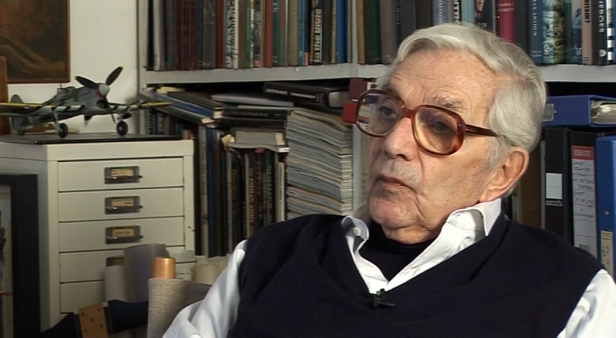NEXT STORY

'I knew everybody was shooting at me'
RELATED STORIES

NEXT STORY

'I knew everybody was shooting at me'
RELATED STORIES


|
Views | Duration | |
|---|---|---|---|
| 11. 'Little did we know how dangerous these bloody rockets were!' | 269 | 01:55 | |
| 12. Trying to avoid being hit by our own explosions | 227 | 02:00 | |
| 13. Finally getting commissioned | 193 | 01:33 | |
| 14. Defence mechanism against getting too emotional | 206 | 02:40 | |
| 15. 'I knew everybody was shooting at me' | 214 | 02:12 | |
| 16. Friendly fire | 192 | 04:43 | |
| 17. Losing fellow pilots on take off | 216 | 02:09 | |
| 18. The 'cab rank' | 184 | 03:10 | |
| 19. 'Order me a late tea' | 1 | 214 | 02:54 |
| 20. Norman Merrett | 1 | 175 | 03:44 |


First of all, we didn't see many enemy aircraft because by that time, which was… I mean, 609 had just celebrated its 200th victory, but that was October '43, and of course I was very keen to get on some of these shows, you see, but then found out that the one or two times that some enemy aircraft were sighted, the CO [commanding officer] or the flight commander were the first ones to get after them, you see.
And... you know, the whole thing at that time still was treated like a sport, and we had really fantastic flight commanders and squadron commanders who... quite a number had been in the Battle of Britain and so on, and so it was, you know… Even eventually when things became very nasty, you know, and we had big losses, if I look at my logbook, the language I used, you know: 'Woody shot down in flames, went into the drink; tough luck'. Things like that, which isn't me at all, you know, but it was a sort of defence mechanism against me getting too emotional. So obviously once you got back on the ground, you know, and you saw that some of your friends were not there any longer it had a… you know, a very sad effect, particularly since sometimes you had to write to the families left behind. And since I was, I think, I was already then a sensitive, very sensitive person, whereas we had Australians and New Zealanders who were really, you know, tough, but I was more sensitive, and... so maybe I felt more these things that were happening around…
Sir Kenneth Adam (1921-2016), OBE, born Klaus Hugo Adam, was a production designer famous for his set designs for the James Bond films of the 1960s and 1970s. Initially, he trained as an architect in London, but in October 1943, he became one of only two German-born fighter pilots to fly with the RAF in wartime. He joined 609 Squadron where he flew the Hawker Typhoon fighter bomber. After the war, he entered the film industry, initially as a draughtsman on This Was a Woman. His portfolio of work includes Barry Lyndon and The Madness of King George; he won an Oscar for both films. Having a close relationship with Stanley Kubrick, he also designed the set for the iconic war room in Dr Strangelove. Sir Ken Adam was knighted by Queen Elizabeth II in 2003.
Title: Defence mechanism against getting too emotional
Listeners: Christopher Sykes
Christopher Sykes is an independent documentary producer who has made a number of films about science and scientists for BBC TV, Channel Four, and PBS.
Tags: 1943, Battle of Britain
Duration: 2 minutes, 40 seconds
Date story recorded: December 2010 and January 2011
Date story went live: 15 August 2011